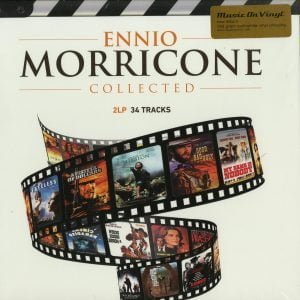Table of Contents:
Browse in the Library:
Once upon a time in the West – Ennio Morricone (C’era una volta il West) Spartiti, sheet music

Best Sheet Music download from our Library.
Once upon a time there was music: ‘Ennio, the teacher’ is a wonderful documentary that shows us who Morricone was
It all starts with the sound of a metronome. We situate ourselves in his house, specifically in his office, that place where so many wonders have been created . And suddenly, he appears, and we accompany him while he performs his flexibility exercises. He is 90 years old but the agility of his movements and the sparkle in his eyes make him look much younger.
Once the routine is over, he sits up and gladly begins to move his arms to direct a non-existent orchestra, while we listen to his beautiful main theme for ‘La Herencia Ferramonti’. Nice to meet you, Master Ennio Morricone .
Having a documentary like ‘Ennio, the teacher’ is, without exaggerating, a miracle . After the brilliant book of interviews written by Alessandro De Rosa and published in 2016, it seemed that we were no longer going to learn more about the figure of the enormous composer. Finally, it has been the good old Giuseppe Tornatore , who has achieved the feat of carrying out his most personal project: discovering who Ennio Morricone is.
Tornatore signs the closest portrait of Morricone
Narrated in chronological order, we witness the composer’s professional career: his beginnings as a trumpeter with his father Mario Morricone, his educational stage with Professor Goffredo Petrassi, his first steps as an arranger for RCA, the reason for the improvisation group Nuova Consonanza and above all, his work for the cinema. Film sequences, archive images and multiple interviews with colleagues and friends by profession accompany Morricone as he speaks not only to our ears, but also to our eyes .
And then the magic happens: the artist hums, laughs, remembers and is moved . We had never seen Ennio, an artist so reserved and critical of his own work (he was never satisfied with his celebrated work for Sergio Leone’s Dollars trilogy) as humane, close and simple as until now. Through his testimony we understand why he dedicates himself to composing for the cinema and, despite his success, the enormous contradiction that this entails for him.
It is beautiful and even poetic that Tornatore was in charge of carrying out this project. Morricone has worked on more than 500 projects with a huge number of directors and although he has repeated with the majority, we can say that one of the most important relationships is the one that arises thanks to ‘Cinema Paradiso’. Since then, the director has not lacked in having his most important collaborator and his filmography has been key in the composer’s last stage , where we can find famous scores such as ‘The Legend of the Pianist in the Ocean’ (winner of the Golden Globe). , ‘Malèna’ (Oscar candidate) or ‘La Correspondencia’, the last soundtrack composed for cinema by the Roman.
Due to its long duration (a total of 156 minutes) and the large number of titles to highlight, the pace ends up being somewhat uneven . There is nothing to object to the extraordinary editing of the film, the pace with which it begins and continues for more than half is stupendous.
But when you get to ‘Once upon a time in America’ and ‘The Mission’ (perhaps the two most important works of his entire career), it gives the feeling that he wants to tell everything that remains in an accelerated way, avoiding talking about much of the American production in the 80s and 90s, and with special emphasis on the Oscars, something that is even annoying because, despite the huge slip of the Academy not awarding ‘The Mission’ to the detriment of Herbie Hancock and his ‘Round Midnight”, other international competitions did award his work (for example, the BAFTAs recognized him each one of the six times he was a candidate, data that is not mentioned).
It is strange that a documentary film about a film music composer is made, and even more so that it manages to be released on screens. Until now the only reference was ‘Music for the Movies: Bernard Herrmann’ released in 1992 and an Oscar candidate. However, this documentary could be said to be of a quite different nature since the greatest of the many merits of ‘Ennio, the teacher’ is that we have the direct and close-up testimony of the composer in a state of grace. It could be said that more than a documentary about Ennio Morricone, it is a film starring himself .
It should be said that Ennio Morricone has always been, along with Vangelis, John Williams and Hans Zimmer (the last two appear in the footage), the most popular soundtrack composer of all time .
And I don’t know exactly if it was a consequence of his work in spaghetti westerns or due to the Mediterranean coincidence, but in Spain he has always been loved and respected a great deal (the Spanish poster for ‘May 1940’ announces his name in capital letters in the title, I have never seen a poster selling the film by the composer of the film before).
Ennio Morricone was born on November 10, 1928 and passed away on July 6, 2020, which sadly means that he did not see this work in life. The artist who always wanted to leave the cinema but the cinema itself never let him go, not only lives on in his scores, but now also with this documentary . It’s been a pleasure meeting you, master.
